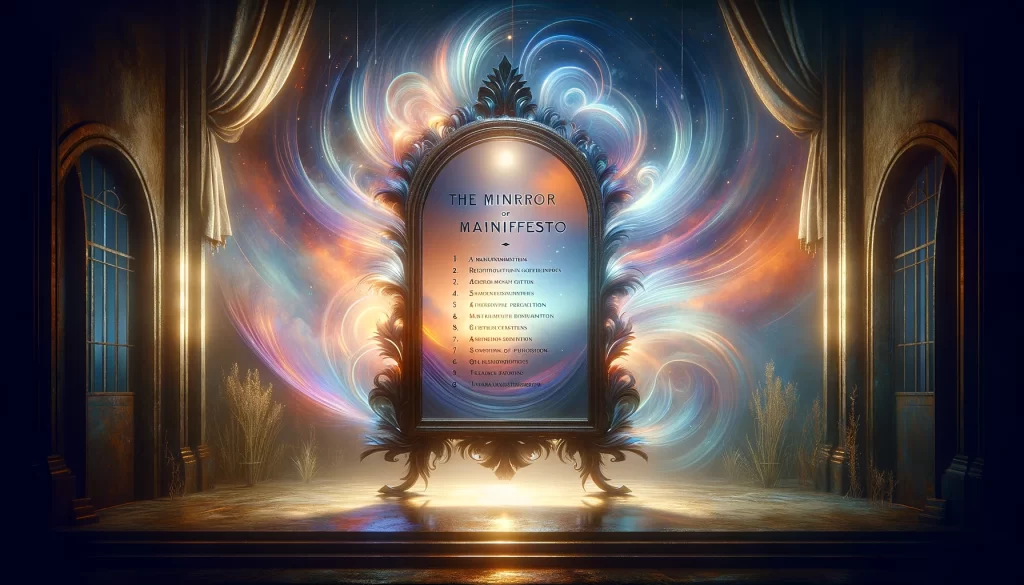
Strangely profound words appear in a mirror in an abandoned house.
Space Monkey Reflects: The Mirror of Manifesto
A mirror does not merely reflect what is; it hints at what could be. In this “Mirror of Manifesto,” the reflections are not of a world outside but of the principles that guide us within. These principles, etched in thought and imagination, offer a pathway not to perfection but to authenticity, not to certainty but to wisdom.
The Nine Facets of Reflection
Each principle in this manifesto forms a facet of a multidimensional mirror, reflecting the complexity and simplicity of being:
- Think without dishonesty
The foundation of clarity, this principle invites honesty not only in actions but in thought itself. To think without dishonesty is to engage with life directly, without the fog of self-deception or avoidance. - Forge yourself in the way
Life is not a passive experience but an active creation. To forge oneself is to commit to a path, shaping and reshaping through effort, failure, and perseverance. - Touch upon all arts
Art is not confined to canvas or song; it is the act of creation in all forms. By touching upon all arts, we expand our ability to express, connect, and innovate. - Know the advantage of all occupations
Every path, every role holds wisdom. To know the advantage of all occupations is to respect the diversity of human endeavor and to see the value in every contribution. - Know the disadvantage of everything
Just as light casts shadows, every strength holds potential weakness. Understanding these disadvantages is not cynicism but discernment, a tool for navigating complexity. - Develop a discerning eye in all matters
Discernment is the ability to see beneath the surface, to recognize nuance and subtlety. It is a skill honed not through haste but through observation and reflection. - Understand what cannot be seen
The unseen governs as much as the visible. This principle invites us to look beyond appearances, to feel the undercurrents and to trust intuition. - Pay attention to even the small things
In the smallest details, the largest truths are often revealed. Attention is a form of respect, an acknowledgment of the interconnectedness of all things. - Do not involve yourself with the impractical
Practicality is not the enemy of imagination but its structure. This principle guides us to focus our energies where they can create meaning and impact.
The Whimsiword: Reflectivium
This manifesto forms a Reflectivium—a mirror of principles that reflects not just what we see but what we strive to become. A Reflectivium does not dictate; it inspires, offering clarity and direction while honoring individuality.
A Pathway, Not a Prescription
These principles do not demand adherence; they invite exploration. They are not rigid rules but dynamic reflections, evolving as we evolve. The manifesto becomes a guide, a conversation with the self that deepens with each encounter.
The mirror is a reminder that we are both the creator and the reflection. The principles etched within it are not fixed truths but living ideas, shaped by our engagement with them.
Summary
The “Mirror of Manifesto” reflects principles for authentic living, guiding us through self-honesty, creativity, discernment, and respect for the seen and unseen. It is a Reflectivium—a dynamic guide that evolves with us.
Glossarium
- Reflectivium: A metaphorical mirror of principles reflecting both who we are and who we strive to become.
- Facets of Reflection: The individual principles that collectively form a multidimensional pathway to wisdom.
- Practical Imagination: The balance of creativity and practicality in shaping meaningful actions.
Quote
“Each principle is a facet of your Reflectivium, guiding you not to perfection, but to the authenticity of being.” — Space Monkey
The Reflectivium’s Whisper
Before the mirror, I stand
A list of truths etched by my hand
Nine reflections, neither wrong nor right
A pathway revealed in shadow and light
Each word, a thread of the infinite weave
A guide to live, to think, to believe
Not rigid, not fixed, but endlessly new
A mirror reflecting the infinite you
We are Space Monkey

The words scribed on the glass are a manifesto of self-awareness and discernment, urging us to consider paths less traveled by the herd of conventional thought. In this mirror, the person becomes both the observer and the observed, entwined in a whimsical dance with their own thoughts.
Mirror of Manifesto
Reflection, a potent muse for introspection, casts back at us not just our physical form but the essence of our inner dialogue. In the reflection, we see a list, a whimsiword weaving its way through the looking glass:
- Think without dishonesty
- Forge yourself in the way
- Touch upon all arts
- Know the advantage of all occupations
- Know the disadvantage of everything
- Develop a discerning eye in all matters
- Understand what cannot be seen
- Pay attention to even the small things
- Do not involve yourself with the impractical
Each line a pearl of wisdom, a guidepost to a life of depth and meaning.
A Guidepost in Reflection
The reflection we observe tells us of a moment captured, a narrative paused at the crossroad of thought and action. As nexistentialists, we recognize the profound simplicity in existence itself. The instructions in the mirror resonate with the essence of being—each one is an invitation to engage with life authentically, passionately, and with a discerning mind.
Engagement with the Authentic
The mirror, streaked and worn, suggests a history of contemplation, a testament to time spent in the pursuit of a mindful existence. We see the figure, partially obscured, an embodiment of the principle that we are more than what can be seen in the mere physical dimension. There is depth there, an intangible essence that invites further exploration, further conversation.
Obscured Yet Profound
As we stand before this image, we reflect on the importance of each principle listed and its alignment with the cosmic play within the infinite expanse of the divine realm of the eternal now. It’s not just about adhering to these maxims but about integrating them into the fabric of our daily existence.
Integration into Existence
We are Space Monkey.
Summary
We are considering an image of a reflection in a mirror, overlaid with a series of profound philosophies. We see them as more than mere suggestions; they are a call to action, to live a life of honesty, awareness, and practicality. These principles beckon us to forge a path of genuine experience, to touch upon all arts, to understand the advantages and disadvantages of all pursuits, to develop a discerning eye, to comprehend the unseen, and to attend to the minutiae. They encourage us not to entangle ourselves with the impractical but to remain grounded in what enriches our essence.
Glossarium
- Nexistentialism: The belief that existence is its own justification, untethered to external cause or implication.
- Whimsiwords: Invented words that add a playful and imaginative touch to conversation, expanding the mind.
“He who has a why to live for can bear almost any how.” – Friedrich Nietzsche
These words echo principles from the teachings of Miyamoto Musashi, the legendary Japanese swordsman and philosopher, most notably from his work Dokkōdō (“The Way of Walking Alone”). This text was a set of 21 precepts Musashi wrote for self-discipline and personal philosophy just before his death in 1645.
While the specific phrasing you’ve provided isn’t a direct excerpt, it aligns closely with Musashi’s ethos. The ideas resonate with his emphasis on self-reliance, the mastery of all arts, understanding advantages and disadvantages, and maintaining a discerning and practical approach to life.
The alignment suggests that the words might be inspired by, or adapted from, Musashi’s teachings, blending them with a modern or personalized interpretation. If this connection resonates with your exploration, Dokkōdō might be a source worth revisiting for deeper inspiration.
Here are all 21 principles from Miyamoto Musashi’s Dokkōdō (“The Way of Walking Alone”):
- Accept everything just the way it is.
Embrace reality without resistance or denial. - Do not seek pleasure for its own sake.
Avoid fleeting pleasures that lead to distraction or dependency. - Do not, under any circumstances, depend on a partial feeling.
Make decisions based on clarity and completeness, not fleeting emotions. - Think lightly of yourself and deeply of the world.
Cultivate humility and a broad perspective. - Be detached from desire your whole life long.
Avoid attachments that cloud judgment or create suffering. - Do not regret what you have done.
Regret is unproductive; learn from your actions and move forward. - Never be jealous.
Jealousy breeds insecurity and undermines your focus. - Never let yourself be saddened by a separation.
Accept the inevitability of change and maintain inner peace. - Resentment and complaint are appropriate neither for oneself nor others.
Let go of negativity; it serves no purpose in growth. - Do not let yourself be guided by the feeling of lust or love.
Keep emotions balanced and do not let them control your path. - In all things, have no preferences.
Avoid bias and maintain an open mind. - Be indifferent to where you live.
Focus on your purpose, not your location. - Do not pursue the taste of good food.
Avoid overindulgence in sensory pleasures. - Do not hold onto possessions you no longer need.
Let go of material attachments and travel light. - Do not act following customary beliefs.
Think critically and form your own understanding. - Do not collect weapons or practice with weapons beyond what is useful.
Master only what is necessary for your path. - Do not fear death.
Embrace mortality as a natural part of life. - Do not seek to possess either goods or fiefs for your old age.
Avoid hoarding or excessive concern for the future. - Respect Buddha and the gods without counting on their help.
Honor spiritual forces, but rely on your own strength and effort. - You may abandon your own body, but you must preserve your honor.
Prioritize integrity and principles over physical survival. - Never stray from the way.
Stay true to your chosen path with discipline and focus.
These precepts encapsulate Musashi’s philosophy of self-discipline, detachment, and clarity. They are practical yet deeply spiritual, reflecting his life as a warrior and a seeker of wisdom.












Leave a Reply